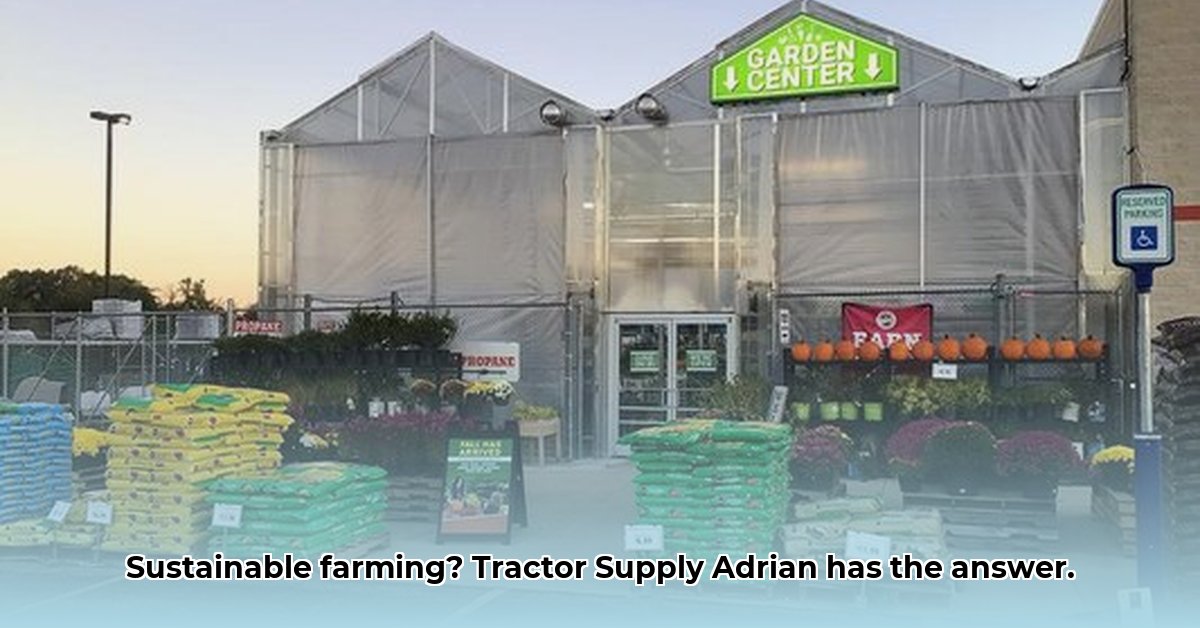
Tractor Supply Adrian's Geographic Context and Potential
Tractor Supply Company (TSC)'s Adrian, Michigan location occupies a strategic position, situated near both residential areas and agricultural lands. This proximity suggests a diverse potential customer base, ranging from home gardeners to large-scale farmers. How effectively can this translate into support for sustainable agriculture practices in the region? This analysis explores TSC's potential role, highlighting data limitations and suggesting avenues for further research. For more information on TSC's practices, see the employee handbook.
Sustainable Agriculture Potential: Products and Practices
TSC's product range includes items relevant to sustainable agriculture, such as organic seeds, water-efficient irrigation systems, and composting supplies. However, the absence of sales data for these specific products prevents a quantitative assessment of actual market penetration and adoption of sustainable practices. Could a targeted customer survey reveal the demand for these items? Are there gaps in TSC's current offerings that inhibit wider adoption? This lack of data highlights a critical need for further investigation.
Stakeholder Analysis: A Collaborative Approach
Several key stakeholders influence the success of sustainable agriculture initiatives in the Adrian area:
| Stakeholder Group | Interests | Potential Contributions |
|---|---|---|
| Tractor Supply Staff | Sales, community engagement, profitability | Promoting sustainable products, customer education, partnerships |
| Local Farmers | Access to affordable, high-quality, sustainable inputs | Providing feedback on product needs and sustainable practices |
| Home Gardeners | Sustainable gardening supplies, resources, knowledge | Representing a significant market for sustainable products |
| Local Government/NGOs | Promoting sustainable agriculture in the community | Policy support, funding, educational initiatives |
Successfully integrating sustainable practices requires collaboration among these stakeholders. Open communication and shared goals are essential for fostering a thriving sustainable agricultural ecosystem.
Risk Assessment and Mitigation Strategies
Several risks could hinder TSC's role in promoting sustainable agriculture:
| Risk Category | Likelihood | Impact | Mitigation Strategy |
|---|---|---|---|
| Low Customer Demand | Medium | High | Targeted marketing campaigns showcasing benefits of sustainable practices, customer education programs. |
| Competition | Medium | Medium | Competitive pricing, differentiated product offerings, strong customer service, loyalty programs. |
| Supply Chain Issues | Low | High | Diversified supply chains, robust relationships with suppliers, contingency planning for disruptions. |
| Regulatory Changes | Low | Medium | Active monitoring of relevant regulations, flexible adaptation of business practices. |
Proactive risk management is crucial for ensuring the long-term success of sustainable agriculture initiatives within the community.
Regulatory Landscape and Compliance
Local, state, and federal regulations concerning pesticide use, water management, and organic certification significantly impact agricultural practices and TSC’s operations. Maintaining compliance is paramount. Any changes to these regulations could create new opportunities or challenges, requiring continuous monitoring and adaptation.
Conclusion: The Path Forward
TSC's Adrian store holds significant potential for fostering sustainable agriculture. Its location and product range are promising. However, the absence of detailed sales data limits a definitive assessment of its current impact. Further research, potentially through collaborations with local universities or agricultural organizations, is needed to quantify the store's contribution. Such research might include customer surveys, inventory analysis, and a comparative analysis of TSC's offerings against other local suppliers. This collaborative approach is essential for achieving a truly sustainable agricultural future in the Adrian area. Doesn't the potential for positive environmental and economic impact warrant a more thorough investigation?